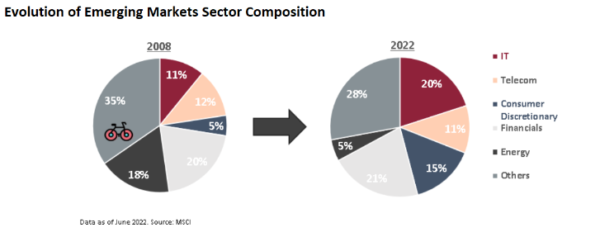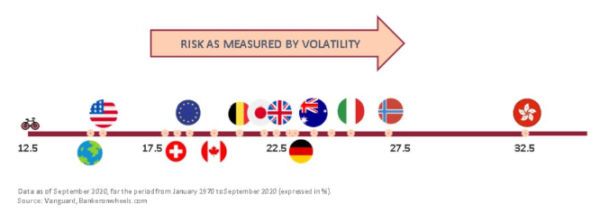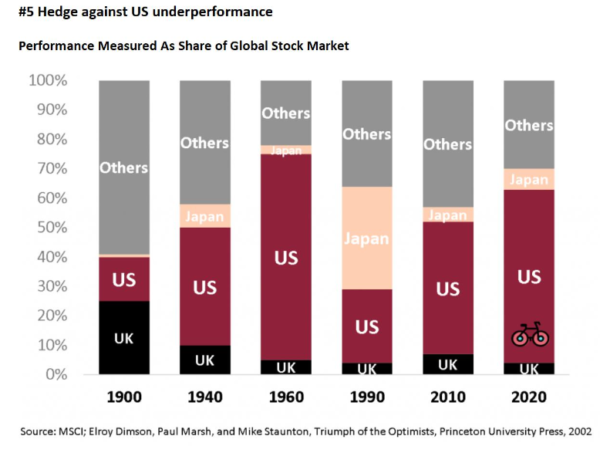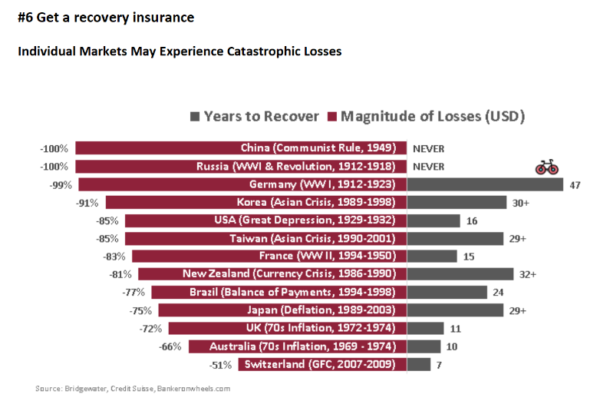Oct
2022
About to buy the S&P? Here’s what you may miss
DIY Investor
12 October 2022
 As portfolio managers, we are constantly reminded of changes in the world’s economy; yet we tend to resist change, especially when we have an emotional attachment to a country.
As portfolio managers, we are constantly reminded of changes in the world’s economy; yet we tend to resist change, especially when we have an emotional attachment to a country.
Over the past 20 years, I visited most of the U.S. States, spent time at NYU and joined a prestigious Wall Street Graduate Programme.
However, while cycling the world I realised this century may not belong to America; and my portfolio needed to reflect it.
Here are risks and opportunity costs to consider by concentrating your investments, and why you should embrace international diversification.
#1 Benefit from the next leap
One of the biggest misconceptions is U.S. Outperformance; in the last 50 years, the U.S. has outperformed the rest of the world by 1% per year – 9.8% vs 8.7%, with lower volatility.
Guess, how much of the 50-year outperformance came in the last 8 years? All of it.
If history is a guide, it is a matter of when, not if, International Stock will catch up again.
#2 Bet on Asia (tech)
Did you know that today Chinese Stocks have almost no impact on the performance of a Global Equity ETF? Combined, Emerging Markets Stocks only represent 10% of a Global ETF because of various screens applied by Index providers.
Without them that should stand at 26% – six out of ten people live in EMs; they account for over 50% of global GDP and by 2025 may capture 70% of global growth.
Tech dominates the S&P 500; what’s less known, is that Asian Tech is rising to the same proportion of EM Indices.
- IT and Communication firms including Samsung, Taiwan Semiconductors, Tencent or Indian Infosys account for over 30% of EM’s Market Cap.
- By adding E-commerce platforms, like Alibaba or JD.com, that make up most of Consumer Discretionary sector investors capture 46% of EM Equities.

US Tech companies predominately focus on their domestic market (see #7) and have little to no access to certain markets; super apps like Tencent’s Wechat or Line are much more powerful than Western apps.
#3 Dilute current hype
By investing globally, nearly a third is allocated to the ‘old’ economy. Yes, by many growth measures, Europe and Japan lag – their heavyweights mainly include Financial or Industrial companies -not glamorous, but relatively cheap.
Remember that you can either have high prices or high future returns, not both. The price you pay matters. The CAPE ratio is just one measure of Stock Markets’ relative attractiveness.
In Dec’21, the US CAPE stood at 39 – expensive level by historical standards; the UK stood at a modest 17.5. Over the next 8 months, the S&P 500 lost over 20% while the FTSE 100 remained roughly flat. Some market participants, including Vanguard, saw it coming; investing globally often means lowering the purchase price by diluting currently overhyped sectors or countries.
#4 Increase the likelihood of financing your goals
Annual Volatility For Global Portfolio And Select Markets

By avoiding hype, you may sleep tight, but another, very practical reason, why you may be more confident of reaching your objectives by investing globally is that over the past 50 years, holding a global portfolio also reduced volatility compared to the S&P 500.
Make no mistake, other countries fared far worse. If you limited your portfolio to European or certain Asian Markets, volatilities were from 15% (Switzerland) to 100% (Hong Kong) greater than the global index, according to Vanguard.
But diversifying globally reduces the uncertainty of financing your investment goals, especially if they are medium-term.
#5 Hedge against US underperformance

There are reasons why the U.S. Stocks increased their relative share from 25% of the Global Stock Market in 1990 to 60% in 2020.
U.S. Corporations are incredible growth engines, powered by technological edge, global exposure, pragmatic thinking and strong governance.
The rule of law, solid institutions and the US Dollar make America a unique place to invest; yet today’s America is like a comet -its nucleus is more powerful than ever, but the dust tail has a hard time following and becomes more visible.
After having cycled Asia and crossed the Pacific I realized that the main challenges the U.S. faces are not external, but internal:
- Parts of America are left behind like the comet’s dust; an impossible catch-up game as inequalities are growing.
- Internal conflicts are rising, whether measured by protests or political drifts.
- Healthcare is inefficient. Lack of social safety net makes scandals that kill hundreds of thousands of people and leave millions addicted, possible.
Similar issues didn’t stop its rise in the past and America can reinvent itself; it is a young country -Warren Buffett and Charlie Munger’s combined age is close to that of the US.
I would never bet against it, but as a European, I don’t need to bet only on America.
#6 Get a recovery insurance
Individual Markets May Experience Catastrophic Losses

Global investing also reduces an even more important risk – the risk of permanently losing your capital.
The U.S. is arguably the strongest country, but this one is less about America and more about country concentration risk in general.
In the past century, there have been many times when investors saw their wealth wiped out by geopolitical upheavals, debt crises, monetary reforms, or the bursting of bubbles, while markets in other countries remained resilient.
#7 Look beyond high correlations
With globalization, it doesn’t matter where a stock trades but where it makes money. For example, the pharmaceutical firm GlaxoSmithKline from UK’s FTSE 100 Index has minimal revenue exposure to the UK – it sells globally, and will be highly correlated to other markets. As do other UK firms that derive 78% of revenues from abroad.
So, why wouldn’t you keep it simple and only invest in the S&P 500 since correlations with other markets are high?
The key aspect to understand is that diversification is more than correlation; it is also about the magnitude of price moves, and magnitude can translate into excess returns.
For example, certain European or Japanese companies’ revenues are very local; these tend to be the same small-cap value stocks that are documented to capture excess long-term returns for investors.
#8 Dare to disagree with Buffett and Bogle
Upon his passing, Warren Buffett directed the trustee for his wife’s benefit to ‘put 10% of the cash in short-term government bonds and 90% in a very low-cost S&P 500 index fund.’ Jack Bogle even went a step further and favoured a fund tracking a larger US Equity Index – the Total Stock Market Fund – Don’t look for the needle in a haystack; buy the haystack. If you follow Buffett and Bogle’s advice, chances are you will end up wealthy. Why? Because the behavioural aspects, low fees, and broad-enough diversification, that both preach will determine most of your success.
They are more important than the S&P 500 vs. World Index debate.
But since you are reading this website, chances are you have an above-average investing acumen. You can use academic research that expands on Buffett & Bogle’s diversification principle and take it a step further.
Don’t try to pick the winning country. Buy them all.
Next steps
More important than the S&P 500 vs. Global Index debate is also sticking to your strategy. It’s one of the reasons why active investing is difficult. Here are 8 other arguments for why active investing is more tricky than you think.
The choice is also not exclusive. You may decide to increase the allocation to the U.S. Market (vs. MSCI ACWI or FTSE All-World allocation) because you think current trends will continue for a while. If that’s your strategy, we cover how to invest in non-US Markets. If you’re in Europe, remember that the cheapest S&P 500 trackers may use a synthetic replication strategy.
But if you’re like most of us, you may prefer sticking to a lazy Global Fund. Here is why it may be a good choice for most investors along with a comparison of leading 5 ETFs.
 Thank you for reading and happy investing, Raph
Thank you for reading and happy investing, Raph
Commentary » Exchange traded products Commentary » Exchange traded products Latest » Latest » Mutual funds Commentary
Leave a Reply
You must be logged in to post a comment.